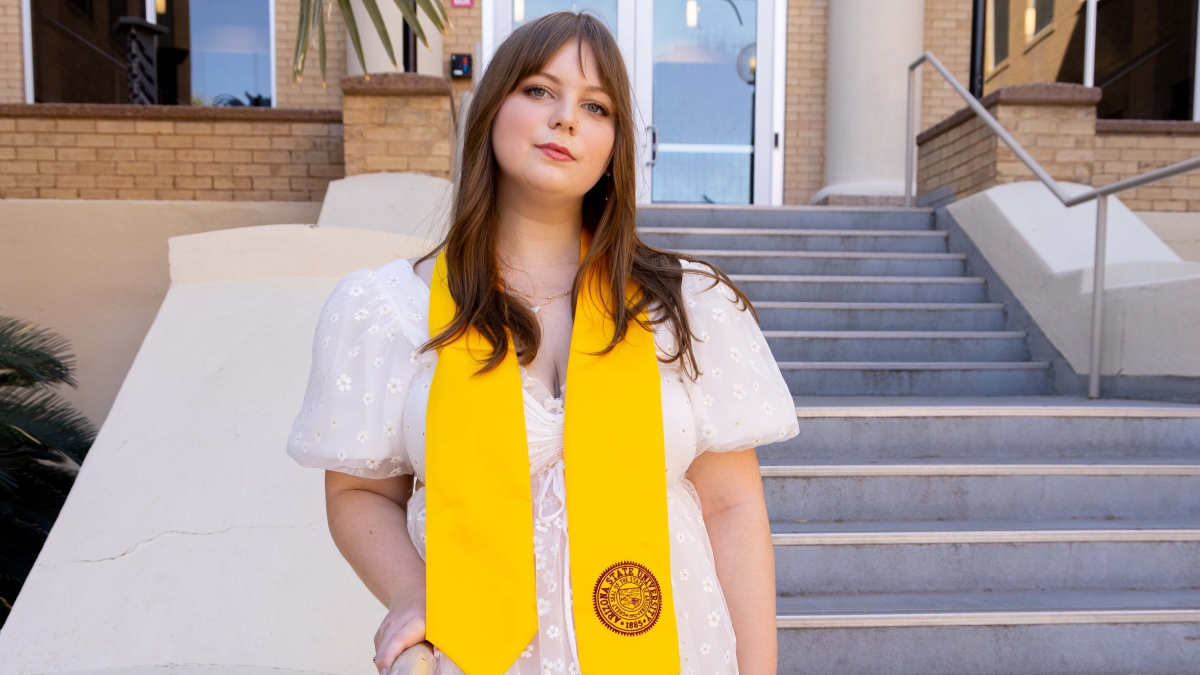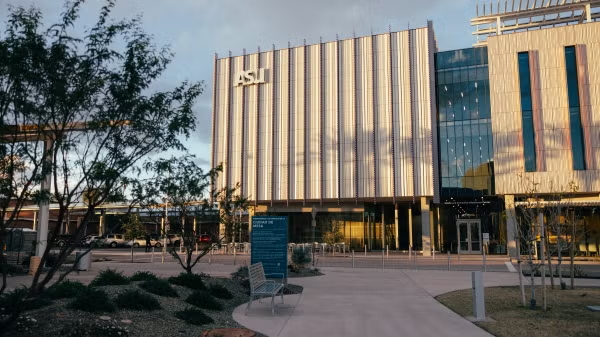ASU graduate, Dean’s Medalist researches fossil primates and human origins

Dean’s Medalist Madeleine Oricchio was an intern for President's Professor Kaye Reed's paleoecology lab for three years and did an independent study with Assistant Professor Kathryn Ranhorn and professors at Rice University and Washington University, working on a database of African scholarship on African archaeology. Photo by Meghan Finnerty
Editor’s note: This story is part of a series of profiles of notable spring 2023 graduates.
Madeleine Oricchio always knew she wanted to study anthropology, and her interest in researching human origins thrived at Arizona State University.
Oricchio was selected as this semester’s Dean’s Medalist by The College of Liberal Arts and Sciences, a prestigious award that recognizes outstanding academic achievement. She is graduating this spring with a Bachelor of Science in anthropology from the School of Human Evolution and Social Change.
“Anthropology is a really interesting major because you can kind of do whatever you want with it,” Oricchio said. “There’s a bunch of different things you can study. And you can do internships, you can do lab work. You can talk to people in the groups that you’re studying, or you can study abroad to go find the answers you’re looking for. So, it really depends from person to person, which is why it’s so great.”
During her time at ASU, Oricchio was an officer with the Undergraduate Anthropology Association and an undergraduate representative for the school's Diversity, Equity and Inclusion Committee.
Note: Answers have been edited for length and clarity.
Question: What was your “aha” moment when you realized you wanted to study the fields you majored in?
Answer: I realized I wanted to study anthropology early on in my high school career. My mom is a history teacher, so as a kid, I always wanted to learn about the past. I frequently would ask what occurred prior to various historical events. I learned about the field of anthropology when I became interested in human origins. After reading Donald Johanson's book “Lucy” in my sophomore year of high school, I knew that I was going to be an anthropologist.
Q: Why did you choose ASU?
A: I decided to go to ASU because the Institute of Human Origins is hosted here. IHO is one of the leading research institutions for biological anthropology, so it made sense to apply to ASU. I also loved the campus as well as all of the resources available to students.
Q: What’s something you learned while at ASU — in the classroom or otherwise — that surprised you or changed your perspective?
A: My first biological anthropology course was "Bones, Stones and Human Evolution," and this course made me realize that there are many areas of study that combine with anthropology to uncover our origins. This made me realize that I could use plants and animals as a way of studying human origins, which is now what I do!
Q: Which professor taught you the most important lesson while at ASU?
A: There are actually two professors I would like to recognize, President’s Professor Kaye Reed and Assistant Professor Kathryn Ranhorn. Both of these professors were incredible mentors for me throughout my entire college experience. Reed and her lab guided me to realize what area of biological anthropology I wanted to study, which is why I now want to focus on fossil primates for my PhD. Ranhorn made me realize that I can study multiple things during my PhD, even if it's a combination of studying social issues as well as fossil primates.
Q: What’s the best piece of advice you would give to students?
A: Take advantage of all of the resources on campus. You are already paying for them through tuition, so it would be a waste to not utilize the services.
Q: What was your favorite spot on campus, whether for studying, meeting friends or just thinking about life?
A: I love going to the Secret Garden in between my classes or whenever I need time to meditate or reflect. The building surrounding the garden dampens the sounds of traffic and campus so all that you can hear are the parakeets in the trees.
Q: What are your plans after graduation?
A: After graduation, I will be taking a gap year before applying to graduate schools for my PhD.
Q: If someone gave you $40 million to solve one problem on our planet, what would you tackle?
A: I would put that money towards scholarships for marginalized groups wanting to study anthropology.
Q: What research were you involved with while at the School of Human Evolution and Social Change?
A: I was an intern for President's Professor Kaye Reed's paleoecology lab for three years and did an independent study with Assistant Professor Kathryn Ranhorn and professors at Rice University and Washington University to make the Bibliographic Database of African Scholarship on African Archaeology. I presented numerous posters in partnership with the School of Human Evolution and Social Change and even had the opportunity to study abroad in South Africa.
Madeleine Oricchio presents at the spring 2023 research symposium at the ASU School of Human Evolution and Social Change.
More Arts, humanities and education

Exceeding great expectations in downtown Mesa
Anyone visiting downtown Mesa over the past couple of years has a lot to rave about: The bevy of restaurants, unique local shops…

Upcoming exhibition brings experimental art and more to the West Valley campus
Ask Tra Bouscaren how he got into art and his answer is simple.“Art saved my life when I was 19,” he says. “I was in a…

ASU professor, alum named Yamaha '40 Under 40' outstanding music educators
A music career conference that connects college students with such industry leaders as Timbaland. A K–12 program that…


